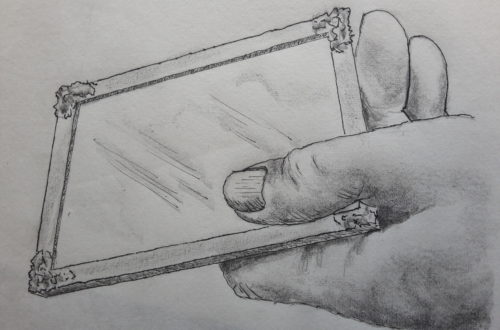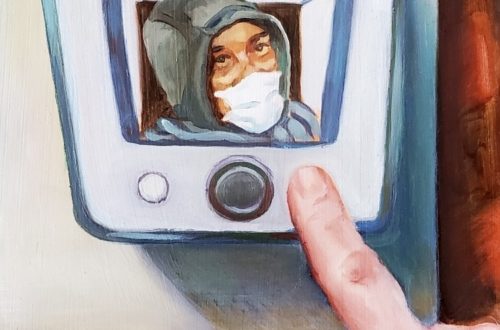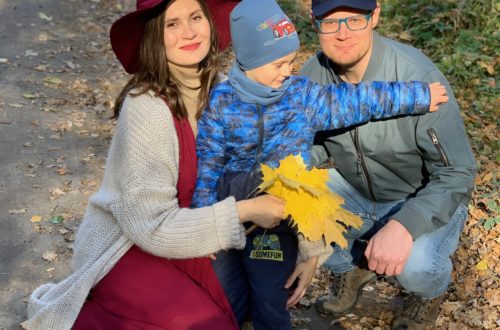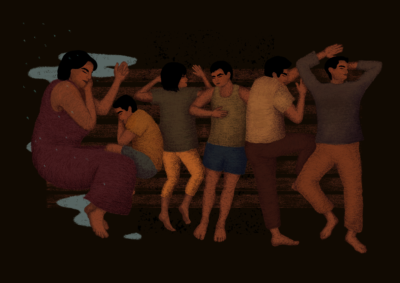
"Showers in Barrio Bagol" by Elizabeth Joy Serrano-Quijano (translated from the Cebuano by John Bengan) Artwork by Kenneth Paul Senarillos
Showers in Barrio Bagol
Here in Lumbang, the rice fields are as wide as the sky. We measure time with the sun. The rising of the sun signals the tilling of soil, our daily labor. The sunset signals the time to rest our bodies.
Since I became aware of my surroundings, this has been our life: no labor, no food. There have been nights when we had nothing to eat especially when nobody would hire us to work. My children are used to our situation. We may be poor, but I work hard so my children could go to school, and with luck one of the five of them could finish, even if it would take a miracle.
As a mother, I yearn in my heart that my children don’t turn out like me. Life is bitter, more so when you’re poor with no education. My husband died when I gave birth to our fifth child. He was on his way to find a midwife when a drunk driver crashed the motorcycle they were riding.
In the course of five years, I hadn’t imagined that life would be harder if my husband was gone, even if he was a drunk, and an angry one. But it was different when he was around the house. For years, we lived in Buhangin. We lived by the river, and according to the government, it wasn’t safe for us to live in Buhangin, and so they asked us to move to Lumbang. We were asked to move even though we didn’t know where to get the materials to build our hut. With the help of my children and some of our neighbors, we built our hut made of cogon, thatch, bamboo, ipil-ipil, and gemelina tree.
Where we moved, the huts stood so close to each other, and living was more difficult.
“Ma, let’s go back to Buhangin,” said Tirso, my eldest child. “At least there, we can still get shellfish.”
“Nak,” I said, “we can’t go back because the Barangay Captain would tell us to leave. Let’s put up with what we have, nak, God will have mercy on us.”
Our hut has two doors, one in front, one at the back. The ground floor is soil, and we have a staircase with three steps toward our sleeping area. We sleep on a floor of bamboo slats, the walls woven strips of bamboo. We have a window without shutters, but we put on it a curtain.
We don’t have a closet because we put our clothes in boxes. Inside our house, we have one table made of ipil-ipil that my husband built. There are four plastic chairs, which we bought after my husband won by gambling in lasto. He placed a bet on the number twelve, the date of our wedding.
After he won, our luck didn’t turn again. We didn’t get more chairs. When we eat by the table, some would sit, while the others would have to stand. We have some embellishments inside the house, ribbons and medals that the children stuck on the walls. There’s a picture taken on our wedding day, and when Tirso was baptized.
My pots and pans I placed on the table pushed to the walls. There I also placed our dishes, glasses, and toothbrushes. Some of the toothbrushes I only asked from Ma’am Tirambulo, when she asked me to clean their house. She was Gingging’s teacher when my daughter was in Grade Three.
“Day, throw this away,” she said, handing me an old toothbrush.
“Ma’am, we can still use this. I’ll keep it. My other children don’t own a toothbrush. I’ll just boil this.”
Ma’am Tirambulo was amused but we did make use of the toothbrush.
In the midst of life’s hardship, we continue to plow the land we don’t own. My eldest child is fifteen years old and would have been in high school. But since he had to stop going to school, he’s still in Grade Six. I have two children in Grade Six, one in Grade Five, one in Grade Three, and my youngest is attending kindergarten.
Life is harsh and tough, but a poor person like me has no right to complain or moan or stop. Even though there are a lot of school fees and my body is spent, after working in the farm I’d go to Councilwoman Lanie to do their laundry.
Sometimes the Councilwoman would take pity on me. After I’m done with laundry, she gives me leftover food and rice. She also gives me clothes that her children have outgrown. Today, because of my children, I carry on.
Only one thing bothers me. When it rains, the showers are too strong over our hut. Because we aren’t done fixing the hut, the window remains open. The strong rain showers soak our sleeping area. So my children won’t get wet, I make sure that I sleep by the window.
One day, Tirso and Ricky, both already of sound mind, arrive from school.
“Ma! Ma! We brought a carboard to cover the window!”
Their enthusiasm amuses me, as though they have brought home a gift, or a huge prize. In the evening, we cover the bare window, and indeed, the showers no longer get into our sleeping area.
“Ma, one my classmates teased me because I live in Barrio Bagol,” says Gingging, my third child. “They say I reek of shit.”
“Let them, Ging,” I say. “Nobody’s died from taunting, but you could die from taking insults to heart. If you don’t mind them, whatever they say has no value.
A great difficulty for us is the toilet, because in our barrio, there are no toilets in houses. People in town say, “We have a hard time building a house, what more a toilet?”
What we do is that after we relieve ourselves, we use coconut shells or husk to cover our mess. The children don’t carelessly pick up a coconut shell because chances are, it contains a large golden turd! Our place was named Barrio Bagol and most of those who lived here are used to the moniker and so it was known in other barrios as well.
“Day, the DSWD announced they’ll be doing a survey next week,” says Maring Ludy while we were plowing soil in a banana plantation.
“Uy, what will they ask us, Maring?”
“Just simple questions, I guess. How many children you have, your job. But you have to report how deprived you are so you’ll be given benefits.”
Indeed, the people from DSWD arrive in our house. I answer them to the best of my knowledge. One of the things they notice is that we don’t have a toilet. One of them tells me that we really need a toilet because our habit of using coconut shell isn’t safe. The practice causes the spread of disease.
I tell them, “That’s true, Ma’am, if I get the money I’ll have a toilet built because we really suffer. I’m a widow and my children are still in school. We have a lot of school fees like the PTA, Red Cross, Girl Scout, and Boy Scout. There are projects that need our contribution. Sometimes, Ma’am, I just cry it all out and pray because I can’t do anything but work the fields and do laundry.”
Nobody from the Health Center has paid us a visit ever since. Once when my fourth child had diarrhea, we spent a few days at the national hospital in Digos. Councilwoman Lanie helped me and I didn’t pay a cent.
“Ma, maybe I should stop going to school, Ma,” Tirso told me when we got back from the hospital. “I’ll help you out. I know how to work in the farm. I don’t want to study anymore.”
“Nak, please, don’t,” I pleaded. “It’s already January. In a few months, you’ll be in high school. Just don’t, Nak. If you think you’re suffering, we all are, but just give this to me as a gift, Nak. We still have some money that we solicited from the Councilwoman. Whatever it is that you need to pay, we’ll pay it. Just don’t drop out from school, Nak, have pity on me.”
The DSWD names the potential beneficiaries of the government’s 4Ps program, but I nearly cry because we aren’t included. Even our other neighbors haven’t been chosen. We are baffled because others whom we know, those who have land, with paying jobs—they’re the ones who became beneficiaries of the 4Ps.
The Councilwoman goes to DSWD, but she tells us:
“Day, you really weren’t selected because they surveyed and found that you had land in Asband. They say you can make use of that land.”
I tell her, “That land isn’t mine, Kagawad. It’s my mother’s. We have land there but we can’t go back because it’s too dangerous. The rebels and the soldiers are still fighting there now. And what about the others who also have lots and jobs, they were selected?”
The Councilwoman can only shake her head. “Don’t worry, Day, God will have mercy.”
The wind blows strong. The leaves feebly thrashing about in the wind. At the back of our house we hear the crashing of coconut shells and leaves. The force of the wind and the showers have woken me. The carboard Tirso and Ricky brought has been torn away. The showers drench my body. As coconuts slam on the ground, I think to myself, “There’s going to be a lot of fallen coconut shells.”
*** *** *** *** ***
Salibo sa Baryo Bagol
Diri sa Lumbang, sama kalapad sa kalangitan ang mga basakan ug uma. Ang adlaw mao ang among timaan sa oras. Inig subang sa adlaw, timaan na kini sa pagsugod sa pag-ugmad sa yuta pinaagi sa among inadlaw nga hurnal. Ang pagpahuway sa adlaw mao sab ang pagpahuway sa among lawas.
Sukad pa sa akong pagmatngon og buot, mao na kini ang among kinabuhi: way hurnal, way kaon. Pipila kagabii nga wa mi ginakaon labi na kung way magpahurnal. Ang akong mga anak naanad na sa among kahimtang. Kabos man mi, apan ako gihapong ginadasig ang akong mga anak sa pagpadayon sa pag-eskwela, yawat na lang adunay usa sa ilang lima ang makalampos, bisan pa man milagro na kaayo kini.
Isip usa ka inahan, nagahandom ako sa akong kasingkasing nga di mahisama kanako ang akong mga anak. Pait ang kinabuhi, mas pait kung pobre ka ug way nahuman. Namatay akong bana niadtong gipanganak nako ang akong ikalima. Paingon unta siya magtawag og mananabang apan nadisgrasya ang motor nga iyang gisakyan kay hubog ang drayber.
Sulod sa lima ka tuig wa ko nagdahom nga mas pait ang kinabuhi kung mawala akong bana, bisan pa man nga palahubog siya ug maoy. Apan lahi ra gyod ang naa siya sa among balay. Pipila ka tuig mi nagpuyo sa Buhangin. Daplin kini sa sapa ug kay matod pa sa gobyerno di daw luwas alang kanamo ang pagpuyo sa Buhangin, mao nga gipabalhin mi diri sa Lumbang.
Gipabalhin mi nga wa mi kabalo asa mi mokuha og mga materyales alang sa pagtukod sa among mga payag. Uban ang tabang sa akong mga anak ug pipila ka mga silingan, natukod namo ang among payag gikan sa kogon, sibit, kawayan, ipil-ipil, ug gemelina.
Digkit ang mga payag diri sa among gibalhinan ug mas lisod ang among kahimtang.
“Ma, balik na lang ta sa Buhangin kay makakuha pa tag kinhason ug isda didto. Diri wa man tay makaon,” ang sugyot kanako sa akong kamaguwangang anak nga si Tirso.
“Nak, di na ta pwede mobalik didto kay papahawaon gihapon ta ni Kapitan. Antos lang ta, nak, maluoy ra ang Ginoo kanato.’’
Ang among payag adunay duha ka pultahan, usa sa atubangan ug usa sa luyo. Ang among salog kay yuta ug adunay hagdanan nga tulo ka lakangan paingon sa among tulganan. Ang salog sa among tulganan kay kawayan, ang bungbong kalakat. Sa among tulganan adunay usa ka bentana nga way tabon apan naay kurtina.
Wa mi bisan aparador kay sa karton ra namo ginabutang ang among mga sinina. Sulod sa among balay adunay usa ka lamisang ipil-ipil nga pinanday sa akong bana. Ang mga bangko nga plastik upat ka buok, napalit namo kini kadtong nakadaog akong bana sa lasto. Numero dose ang iyang gipatdan kay mao kana ang petsa sa among kasal.
Sukad nga nakadaog siya, wa na kini masundi. Ang among bangko wa na mapun-i. Inig mangaon mi, ang uban makalingkod, ang uban magtindog. Sulod sa among balay adunay gamayng dekorasyon, naay mga ribon ug medal sa mga bata nga akong gipapilit sa bungbong. Aduna say piktyur sa bag-o ming minyo ug kadtong bunyag ni Tirso.
Ang akong mga kaldero ug karahay gipatong nako sa kilid sa among lamisa nga gidikit sa bungbong. Didto sab nako ginabutang ang among mga plato, baso, ug toothbrush. Ang uban sa mga toothbrush pinangayo lang nako kay Ma’am Tirambulo, kadtong gipalimpyo ko nila sa ilang balay. Siya ang maestra ni Gingging pag grid tri.
“Day, ilabay na ning mga toothbrush,’’ dungan og tunol sa akoa.
“Ma’am magamit pa man ni. Akoa na lang ni. Wa pa toy toothbrush ang uban nakong anak. Akoa lang god initan og tubig.’’
Nahimuot na lang si Ma’am Tirambulo sa akoa apan napahimuslan gyod namo ang mga toothbrush.
Taliwala sa kalisod sa kinabuhi, padayon gihapon kami sa pag-ugmad sa yuta nga di namo gipanag-iya. Ang akong kamaguwangan, kinse anyos na ug unta hayskul na. Apan tungod kay sigeg undang, grid siks pa kini. Duha ang akong grid siks, usa ka grid payb, usa ka grid tri, ug ang akong kamanghoran naa na sa kinder.
Lisod ug pait ang kinabuhi, apan sama kanako nga pobre wa koy katungod nga moreklamo o magyawyaw ni moundang. Bisan daghang bayronon sa eskwelahan ug bisan kapoy kaayo ang akong lawas, human manghurnal mo-ekstra pa kog labada ila kang Kagawad Lanie.
Usahay maluoy si Kagawad sa akoa. Human nakog laba, padal-an ko niyag mga bahaw ug sud-an. Ang mga tinuboan sa iyang mga anak iya sab ipadala sa akoa.
Karon, tungod sa akong mga anak, gapadayon ko.
Usa lang ang nakadalag kahasol kanako. Inig mag-ulan, kusog kaayo ang salibo sa among payag. Kay lagi wa pa nahuman ang among payag, ang bentana abri ra. Ang kakusog sa salibo mosulod sa among tulganan. Aron di mabasa ang akong mga anak, ako ang moplastar dapit sa may bentana.
Usa ka adlaw, niabot si Tirso ug Ricky, ang akong mga anak nga but-an nag pangutok.
“Ma! Ma! Naa mi dalang karton atong itabon sa bentana!”
Nahimuot ko sa ilang kadasig nga daw nakadala silag dakong gasa o di ba kaha, dakong premyo. Pagkagabii, gitapakan namo ang abreng bentana ug tuod man, ang ulan wa kaayo nakasalibo sa among higdaanan.
“Ma, gisungog god ko sa akong klasmet kay taga Baryo Bagol daw ko. Baho daw kog tai,’’ ang sumbong ni Gingging nga akong ikatulo.
“Sagdi lang na sila, Ging. Way namatay sa kantyaw, apan naay namatay sa pagtubay sa kantyaw. Kung di nimo sila panumbalingon, wa ra nay pulos ilang gisulti.’’
Dakong kalisod alang kanamo ang kasilyas tungod kay diri sa among baryo, way mga kasilyas ang mga panimalay. Matod pa nila, “Naglisod na gani mig tukod og balay, kasilyas pa kaha?’’
Ang among ginahimo, inig kahuman namog kalibang, tabonan lamang namo kinig bagol o bunot. Ang mga bata di magpatakag punit og bagol kay segurado nga ang sulod ani dakong bulawang tai! Gipanganlan ang among dapit og Baryo Bagol ug sagad sa mga nagpuyo diri naanad na sa maong tawag ug nadala na pod kini bisan pa sa mga duol nga baryo.
“Day, ingon ra ba tong taga DSWD nga mag-survey daw sila sunod semana. Ayaw gyod lakaw ana kay basin maapil ta sa 4Ps,’’ ingon ni Maring Ludy sa ako samtang nanghurnal mi sa kasagingan.
“Uy, unsa man sab ang mga pangutana ana, Maring?’’
“Kanang, dali ra man daw. Pila imong anak, unsa imong trabaho. Pero dapat gyod daw isulti nimo unsa ka kapobre aron maapil ka sa mga matagaan og benepits.’’
Tuod man, niabot ang taga DSWD sa among balay. Gitubag nako sila kutob sa akong makaya. Usa sa ilang namatikdan kay wa mi kasilyas. Sumala pa sa usa kanila, kinahanglan naa gyod mi kasilyas kay delikado ang among pagtabon og bagol sa among tai. Mao unya kini hinungdan sa mga sakit.
Ang tubag nako, “Mao lagi, Ma’am, kung makakwarta ko makapabuhat man gyod mig kasilyas apan pait gyod kaayo. Byuda ko ug nagtuon pa ang akong mga anak. Naa pay mga bayronon sa eskwelahan sama sa PTA, Red Cross, Girl Scout, ug Boy Scout, Naa pay amotan sa mga project. Usahay gani, Ma’am, ihilak na lang nako ning tanan dala sa pag-ampo kay wa man gyod koy laing mabuhat gawas sa paghurnal ug paglaba.’’
Sukad masukad sab wa pay taga Health Center nga nakaduaw sa amoa. Dihang kadtong nagkalibanga ang akong ikaupat ug kamanghoran, pipila mi ka adlaw sa national hospital sa Digos. Gitabangan ko ni Kagawad Lanie ug wa koy nabayran.
“Ma, moundang na lang ko eskuyla, Ma. Motabang ko sa imo. Kabalo na man ko manghurnal. Di na ko gusto moeskwela,’’ mao kini ang gisugat kanako ni Tirso gikan mi sa ospital.
“Nak, ayaw intawon, Nak, Enero na. Pipila na lang man ka bulan pwede na ka mag hayskul. Ayaw na lang god, Nak. Kung nag-antos ka, nag-antos man tang tanan pero iregalo na lang na sa akoa, Nak. Naa pay gamay nabilin sa na-solisit namo ni Kagawad. Kung unsa man imong mga bayronon, bayaran nato na. Basta ayaw lang gyod undang, Nak, maluoy ka nako.’’
Gipatawag na sa DSWD ang mga nahimong benepisyaryo sa 4Ps sa among baryo, apan kahilakon kaayo ko kay wa ko naapil. Bisan ang among ubang silingan wa naapil. Natingala mi pag-ayo nga ang uban namong kaila, naay yuta, naay trabaho, mao na hinuon ang naapil sa matagaan og 4Ps.
Giadto ni Kagawad ang DSWD apan matod pa niya:
“Day, wa gyod daw ka naapil kay ilang gisubay ug naa man daw kay yuta sa Asbang. Naa man daw pwede mauma didto.’’
Gitubag sab nako siya “Di man to akoa, Kagawad. Sa ako man tong inahan. Naa mi yuta didto apan di man sab mi makabalik didto kay gubot baya kaayo. Naggiyera pa gani ang mga rebelde ug sundalo karon didto. Unya ang uban man lagi, naa man sab na silay yuta ug trabaho nganong naapil man sila?’’
Naglingo-lingo na lang si Kagawad. “Sige lang, Day, maluoy ra ang Ginoo.’’
Kusog ang hapak sa hangin. Ang mga dahon nalamba-lamba daw way umoy ug way mahimo sa kakusog sa hangin. Sa luyo sa among payag madungog ang mga nangahulog nga lubi ug lukay. Ang kakusog sa hangin ug ang salibo sa among bentana maoy nipukaw kanako. Nahulog na ang karton nga gidala ni Tirso ug Ricky. Mao nga ang salibo nibasa sa akong lawas. Samtang naglagubo ang mga nangatagak nga lubi, sa akong hunahuna: “Daghan na sad nig pulak ug bagol.’’
*** *** *** *** ***
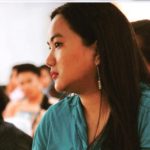 Elizabeth Joy Serrano-Quijano received a B.A. in Mass Communication from Holy Cross of Davao College, where she developed her passion for journalism and creative writing. She works as a college instructor, teaching development communication at Southern Philippines Agribusiness and Marine and Aquatic School of Technology (SPAMAST)–Malita, Davao Occidental. She is proud of her Igorot, Kapampangan, and Blaan roots. Her writing is also her advocacy for the indigenous people of Davao del Sur.
Elizabeth Joy Serrano-Quijano received a B.A. in Mass Communication from Holy Cross of Davao College, where she developed her passion for journalism and creative writing. She works as a college instructor, teaching development communication at Southern Philippines Agribusiness and Marine and Aquatic School of Technology (SPAMAST)–Malita, Davao Occidental. She is proud of her Igorot, Kapampangan, and Blaan roots. Her writing is also her advocacy for the indigenous people of Davao del Sur.

John Bengan teaches at the Department of Humanities in the University of the Philippines Mindanao. His work has appeared in Likhaan 6, Kritika Kultura, BooksActually’s Gold Standard, and Cha: An Asian Literary Journal, among others. He holds an MFA in creative writing from The New School. His literary translations of Elizabeth Joy Serrano-Quijano’s work have appeared or are forthcoming in Words Without Borders, World Literature Today, and Shenandoah.

Kenneth Paul Senarillos lives in Davao City. He holds a degree in Media Arts from the University of the Philippines Mindanao. He currently works as an Art Director for a local newspaper.


